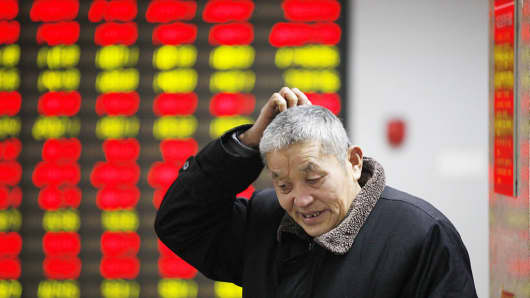
Source: CNBC
Chinese markets extended an already rough start to the year Monday, losing further ground after another sell-off in late afternoon trade that sent mainland indexes down more than 5 percent.
The Shanghai composite tumbled 168 points, or 5.29 percent, to 3,017.99, while the Shenzhen composite plunged 130.61 points, or 6.6 percent, to close at 1,848. In afternoon trade, Hong Kong's Hang Seng index was down 2.3 percent, slipping below the 20,000 threshold for the first time since June 2013.
The rest of Asia also closed down, with Australia's main ASX 200 index continued its downward slide, ending 58.63 points, or 1.17 percent, lower at 4,932.20. The energy, materials and financials sectors weighed, with those indexes down 1.8, 2.95, and 1.27 percent respectively.
In South Korea, the Kospi shed 22.78 points, 1.19 percent, to close at 1,894.84 on Monday's session, with commodities sectors seeing early losses.
Mainland brokerages suffered steep losses, with shares down as much as 9 percent at market close. Citic Securities' mainland-listed shares were off 7.01 percent, while its Hong Kong-listed ones fell 5.53 percent. Airlines stocks on the mainland traded mixed, between up 3.72 and down 1.54 percent. Airlines tend to see an earnings boost when oil prices fall.
On Monday the People's Bank of China
(PBOC) guided the yuan higher by setting the mid-point fix at 6.5626
against the dollar. On Friday, the midpoint was fixed at 6.5636. The
yuan traded at 6.5818 against the dollar.
The yuan-based Hong Kong Interbank Offered Rates (Hibor) spiked to over 13 percent from 4 percent Friday as offshore yuan volume declined.
Last week, the Shanghai Composite lost all of its 2015 gains, falling by 9.97 percent in just five days. Trading in Chinese markets was halted twice last week by circuit breakers - a market-calming regulatory tool - that were only implemented in the country at the start of the week.
The circuit breakers were designed to trigger a 15-minute trading halt if the CSI 300 index fell 5 percent. If that index moved by 7 percent, trade was halted for the rest of the session. By the end of the week, China suspended its circuit breakers, but investors remained wary over the country's ability to handle financial turmoil.
Experts said the ongoing crisis in Asia's largest economy would have bigger, broader implications about the region's economic prospects.
Taimur Baig, chief economist for Asia at Deutsche Bank Research, said in a note on Friday, "The key risk is China, where fears of continued economic slide are causing capital outflows, exchange rate depreciation, asset market selloff, and policy dilemmas."
Baig noted that while this might not halt economic growth in the mainland, with large parts of the economy operating independently of the country's stock markets, it would hurt sentiment -- not just in China, but also in rest of Asia, causing possible deflation, credit crunches and policy challenges.
The yuan-based Hong Kong Interbank Offered Rates (Hibor) spiked to over 13 percent from 4 percent Friday as offshore yuan volume declined.
Last week, the Shanghai Composite lost all of its 2015 gains, falling by 9.97 percent in just five days. Trading in Chinese markets was halted twice last week by circuit breakers - a market-calming regulatory tool - that were only implemented in the country at the start of the week.
The circuit breakers were designed to trigger a 15-minute trading halt if the CSI 300 index fell 5 percent. If that index moved by 7 percent, trade was halted for the rest of the session. By the end of the week, China suspended its circuit breakers, but investors remained wary over the country's ability to handle financial turmoil.
Experts said the ongoing crisis in Asia's largest economy would have bigger, broader implications about the region's economic prospects.
Taimur Baig, chief economist for Asia at Deutsche Bank Research, said in a note on Friday, "The key risk is China, where fears of continued economic slide are causing capital outflows, exchange rate depreciation, asset market selloff, and policy dilemmas."
Baig noted that while this might not halt economic growth in the mainland, with large parts of the economy operating independently of the country's stock markets, it would hurt sentiment -- not just in China, but also in rest of Asia, causing possible deflation, credit crunches and policy challenges.
No comments:
Post a Comment